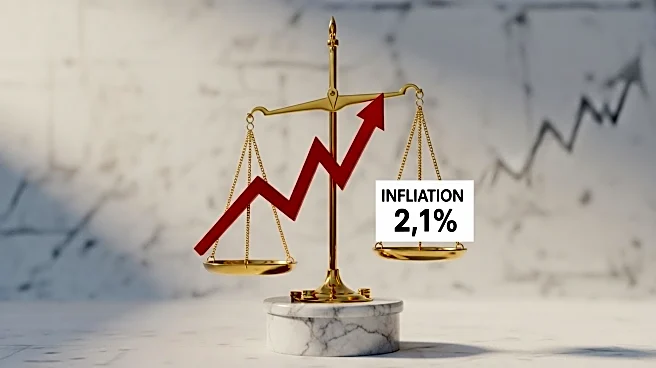What's Happening?
Eurozone inflation has increased to 2.1% in August, marking a significant rise in the region's economic indicators. This development is part of a broader analysis provided by the Financial Times, which is included in their free schools access program. The article outlines the macroeconomic objectives related to maintaining a low and stable rate of inflation, as well as the causes of inflation. It also discusses demand management strategies, specifically contractionary monetary policies aimed at reducing inflation, and evaluates the effectiveness of these policies. The European Central Bank (ECB) has set a target rate of inflation, and the article explores the methods used by the ECB to control inflation, including the use of aggregate demand and supply diagrams to illustrate these methods.
Why It's Important?
The rise in inflation within the Eurozone is a critical economic issue that can have far-reaching implications for global markets, including the U.S. economy. Inflation affects purchasing power, cost of living, and can influence monetary policy decisions. For U.S. stakeholders, understanding these dynamics is essential as they can impact trade relations and investment strategies. The effectiveness of the ECB's methods to control inflation is also of interest, as similar strategies may be considered by the Federal Reserve in managing U.S. inflation rates. Businesses and policymakers must monitor these developments to anticipate potential shifts in economic conditions that could affect international trade and financial stability.
What's Next?
The ECB is likely to continue its efforts to manage inflation through monetary policy adjustments. Stakeholders, including businesses and governments, will be watching closely to see how these policies affect economic growth and stability in the Eurozone. There may be discussions on the need for additional measures or reforms to address inflationary pressures. The outcome of these efforts could influence future policy decisions in other regions, including the U.S., as they seek to balance economic growth with inflation control.
Beyond the Headlines
The rise in Eurozone inflation may also have cultural and social implications, as increased living costs can lead to public dissatisfaction and influence political dynamics. There could be ethical considerations regarding the impact of inflation on lower-income populations and the measures taken to mitigate these effects. Long-term shifts in economic policy and public sentiment may arise as stakeholders seek sustainable solutions to inflationary challenges.











